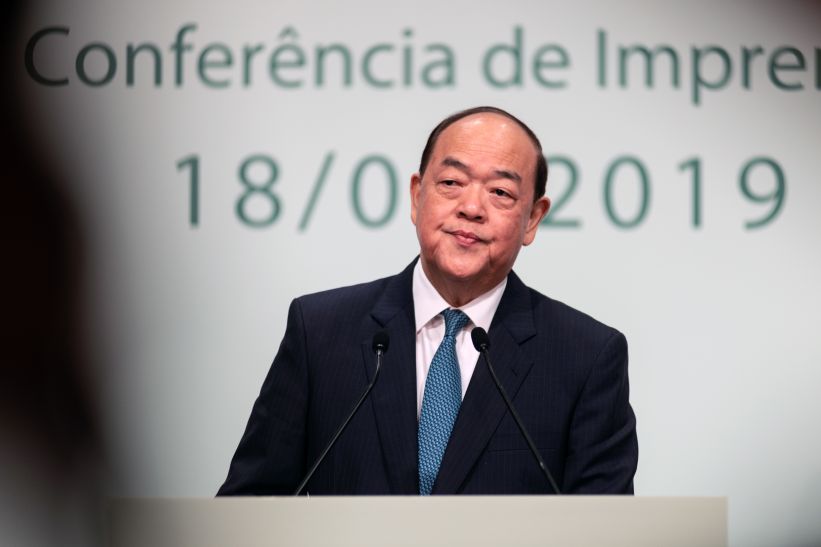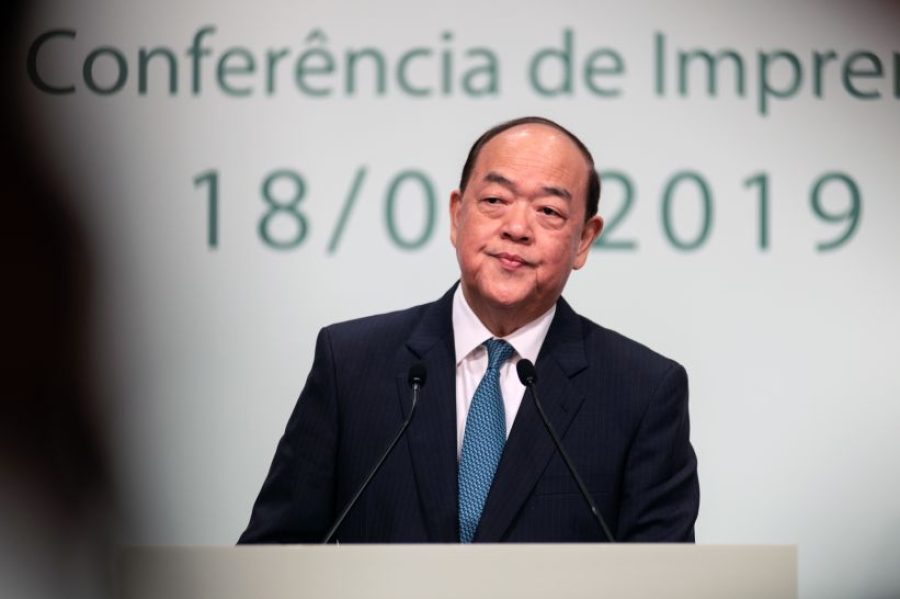Chief executive candidate Ho Iat Seng bade farewell to lawmakers on Friday following his resignation from the Legislative Assembly (AL), saying that as he has decided to run for Macau’s top post, he chose to quit the legislature instead of merely suspending his seat.
After Ho read a statement on his resignation at the start of a plenary session in the legislature’s hemi-cycle on Friday afternoon, his resignation from the legislature took immediate effect.
He then bade farewell to his fellow legislators in the hemicycle and left the AL building. Afterwards, the plenary session was presided over by Legislative Assembly Vice President Chui Sai Cheong, who is widely expected to become Ho’s successor at the helm of the legislature.
Ho, 62, convened a press conference on Friday to brief the media about his work and career in the legislature during the past 10 years. In the press conference which took place in a meeting room of the building, Ho said that he would announce his resignation during the plenary session in the afternoon. Ho noted that lawmakers are not barred by law from running for chief executive, while their seats are merely suspended after having officially been accepted as a chief executive candidate.
Ho said that his situation was however special as the legislature’s president – who also heads the legislature’s executive board. Ho said that if he had chosen to merely have his seat suspended, this would have reduced the number of members of the executive board from four to three during the period he was carrying out his election campaign, adding that such a situation would “not be a good thing” for the legislature’s operation and consequently he chose to give up his seat in the legislature. “As I have decided to run for chief executive, I chose not to procrastinate and not to leave the door open (for a possible return to the legislature),” Ho said.
According to the Chief Executive Election Law, a candidate must obtain at least 66 nominations from among the 400-member Chief Executive Election Committee. After a nominee submits the nominations that he or she has obtained, the Chief Executive Electoral Affairs Commission will then assess whether the nominee can be formally accepted as a chief executive candidate. A lawmaker will have his or her seat suspended if they are officially accepted as a chief executive candidate until the day the election outcome is announced. If a lawmaker is elected as chief executive, he or she will be disqualified from being a lawmaker on the day when taking office as chief executive.
The formal candidacy nomination process runs from today until July 23.
In the press conference, Ho noted that following his resignation, lawmakers will have to elect their new president within 15 days and the government will have to carry out a by-election to fill in the vacancy left by his resignation within 180 days. Ho said that he believes that the government will only conduct the by-election after the upcoming chief executive election – which will take place on August 25.
Ho, bom in Macau in June 1957, was first elected as an indirectly-elected legislator representing the city’s business sector in 2009 and served as vice-president of the legislature in 2009-2013. He was re-elected as an indirectly-elected lawmaker in 2013 and was elected by his peers in the legislative hemicycle as the speaker of the legislature for the 2013-2017 term. He was re-elected as an indirectly-elected lawmaker and re-elected as the legislature’s president in 2017. Ho was a member of the Executive Council – the local government’s top advisory body – from 2004 to 2009.
During Friday press conference. Ho said that the work performance of the legislature had constantly improved in terms of its legislative duties and tasks monitoring the government. Ho said he was satisfied with the lawmakers’ work performance and dedication while he presided over the legislature. He was quick to admit that there was still a large gap between the legislature’s work and residents’ expectations, adding that there was still much room for the legislature to improve its performance. Ho also noted lawmakers’ high attendance rates during every plenary session.
Ho said that the most unforgettable incident for him and the biggest challenge to him during his time at the helm of the legislature was the “surrounding” of the legislature building by thousands of protesters who opposed the government’s controversial perks bill – that would have given lavish retirement packages to top officials – in 2014.
Ho said that the incident was a warning to him that the legislature’s work should always meet residents’ expectations. Ho said that the incident showed that there would be a major problem in civil society if the contents of a bill are not in line with residents’ views by a wide margin. Ho said that the legislature has learnt from the experience of the incident in order not to make another mistake of the same kind.
Ho noted that Macau has an executive-led political system. He said that the administration, legislature and judiciary carry out their own duties independently, adding that the legislature only has the power to carry out legislative tasks and monitor the government. “If the administration does a good job, it will be easier for the legislature to do a good job,” Ho said, adding that if the government had done a good job at that time, the 2014 incident would not have occurred. “If the government does a good job, why will residents still spend time to protest,” Ho asked rhetorically.
Commenting on views in civil society calling for committee meetings in the legislature to open their doors to the public. Ho said that the Legislative Assembly Procedure Rules do not bar committee meetings from opening their doors, according to which a particular committee could decide on its own whether it would open its doors for a particular meeting to the media.
Ho was quick to add that he personally believed that it’s not a good idea for a committee to open its doors for meetings when its members are reviewing a bill article-byarticle – following the passage of its outline during a plenary session. Ho said that during the process when the bill is being reviewed, its contents are subject to possible changes and the draft version may be very different to the final version of the bill which will then be re-submitted to another plenary session for its final debate and article-by-article vote. He said that opening the meetings to the public when the bill is being reviewed by a committee might confuse and mislead residents.
Ho formally announced his bid for chief executive in a press conference on June 18. Ho’s intention to run for the special administrative region’s highest post initially emerged earlier this year when he told reporters on February 13 that he was “actively and prudently” considering running for chief executive. Ho announced on April 18 that he had “provisionally” decided to run in the chief executive election. The Standing Committee of the National People’s Congress (NPC) in Beijing passed a decision on April 23 to approve Ho’s request to resign from the nation’s top legislature, which cleared the way for his bid for the chief executive post.
Ho, an entrepreneur and widely respected community leader, was elected as an NPC deputy from Macau in 2000 and was then elected as an NPC Standing Committee member in 2001. He had been an NPC Standing Committee member ever since – the only one from Macau -until April 23 when his resignation request was approved by the NPC Standing Committee.
There are five other residents who have meanwhile expressed their intention to run for chief executive. Observers do not expect any of them to be able to gamer at least 66 endorsements from the 400-member Chief Executive Election Committee to be able to formalise their candidacy. (Macaunews)






